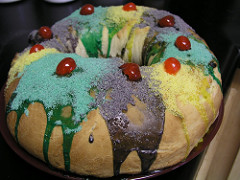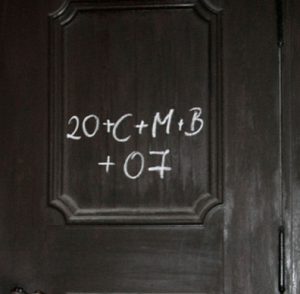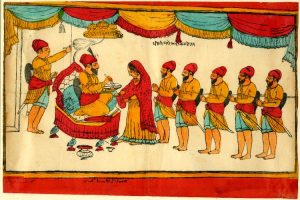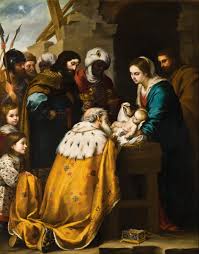January 5, 2019 - Twelfth Night
Twelfth Night is a Christian holiday, celebrated on January 5. It marks the twelfth and final night of the Christmas season and the coming of Epiphany. Contrary to popular belief, Christmas is not just December 25. Contrary to popular belief, Christmas is not just December 25. That is only the first day of Christmas and it includes the eleven days that follow. The Twelve Days of Christmas begin on Christmas Day (December 25) and end on Epiphany (January 6).
During the Middle Ages, Christmas was a time of continuous feasting and merriment, which climaxed on Twelfth Night. The days and nights are counted separately. Therefore, the height of celebration became the night before, or eve, of Epiphany. The twelve day count actually begins with the night of December 25, the "first night." The day of December 26 is the "first day," the night of December 26 is the "second night," and so on. The Twelfth Night is the night before Epiphany, and the twelfth day is Epiphany itself.
Food and drink are central in the celebrations of this holiday. The punch, called wassail, is consumed during Christmastime, but especially on Twelfth Night. Around the world, special pastries, such as the tortell and king cake, are baked on Twelfth Night. They are eaten the following day for the Feast of the Epiphany celebrations. Some people chalk their doors as a way of blessing their home. This year, they would write "20 + C =M +B + 19" in chalk. The letters have two meanings. They represent the initial of the Wise Men (Caspar, Malchior, and Balthazar). They also abbreviate the Latin phrase, Christus mansionem benedicat “May Christ bless the house.” The “+” signs represent the cross, and the “20” at the beginning and the “19” at the end mark the year.
There is also a popular belief that it is unlucky to leave Christmas decorations hanging after Twelfth Night, though some may leave them up until Candlemas. Other popular Twelfth Night customs include singing Christmas carols, having one's house blessed, merrymaking, as well as attending church services.
In some countries, Twelfth Night and Epiphany mark the start of the Carnival season. For Carnival in the United States, think about New Orleans, where it lasts through Mardi Gras Day.
Learn more about Twelfth Night below with the books below.
January 5, 2019 - Gurpurab Guru Gobind Singh
Gurpurab Guru Gobind Singh is a Sikh festival that celebrates the birthday of Guru Gobind Singh. He was born on January 5, 1666, and was the tenth and last Sikh Guru. Sikhism started with a single man, Guru Nanak. Before he died, he chose a successor from his followers to replace him as Guru (leader) of the Sikhs. Each Guru chose a successor before they died, until Guru Gobind Singh.
By Guru Gobind Singh's time, there were problems in the Sikh community. The people who managed the money had become corrupt. They often withheld or misused the money. Some other people pretended to be the Guru and spread false information. This created a lot of confusion. The Guru believed these problems could be solved by not having Gurus anymore. But, Sikhs would still need some form of spiritual authority. To solve that problem, Guru Gobind Singh created the Khalsa (brotherhood).
The Khalsa was created when Guru Gobind Singh brought his followers to Anandpur for the harvest festival, in 1699. Once there, he asked if anyone was willing to sacrifice their head for the Guru. One person volunteered, and the Guru took him into a tent.The followers heard a loud thud, and soon after, the Guru emerged, with his sword dripping with blood. This process was repeated until five people had volunteered. A short while later, the Guru left the tent, and the five volunteers emerged. The Guru named them the beloved ones (Panj Piare). He said they were the start of a new sovereign order called Khalsa. Then the Guru initiated the Khalsa using a ritual that past Gurus used after nominating their successors. After he initiated the Khalsa, he had them initiate him into the Khalsa as well. The Khalsa could initiate anyone as a new member. These members would carry forward the spiritual authority of Sikhism.
The Guru died from the wounds of an assassin attack in 1708. The attack was ordered by the state, which still wished to convert all people to Islam. As he lay dying, the Guru declared the Guru Granath (the sacred Sikh text) and the Khalsa to be the final authority in Sikhism.
Sikhs celebrate this day with a celebration that takes place over three days. The Sikh temple in Everett, MA is planning a celebration this year for January 4-6, 2019. There will be recitations of the Sikh scriptures, different types of prayer, and the telling of a religious story as a part of this event
Learn more about the Guru, the Khalsa, and the Sikh religion with these items:
Glimpses of the Divine Masters
January 6, 2019 - Epiphany
Epiphany, also called Feast of the Epiphany, Theophany, or Three Kings’ Day, is a Christian holiday celebrated Twelve days after Christmas, typically on January 6. It is also celebrated on January 19 for Orthodox Churches who have Christmas on January 7.
In western churches, the holiday celebrates the visit of the Three Wise Men, sometimes called the Three Kings, to the baby Jesus. It also begins the liturgical season of Epiphanytide, which the season after Christmas time. For eastern (Orthodox) churches, Epiphany marks the baptism of Jesus in the Jordan River. The word "epiphany" comes from the Greek epiphaneia which means "manifestation". The periods of Jesus' life that are revisited during the holiday are his birth and baptism. These are the first two times his divine powers manifested.
-
special pastries,
-
singing,
-
chalking the door (mentioned above),
-
having one's house blessed,
-
consuming Three Kings Cake,
-
winter swimming, and
-
attending church services
Some children receive their presents on this day as well, signifying the gifts given to the baby Jesus by the Three Wise Men. It is also customary for Christians to remove their Christmas decorations on Epiphany Eve, Twelfth Night. According to tradition, those who fail to remove their Christmas decorations on Twelfth Night must leave them untouched until Candlemas. This is the second, and last opportunity to remove them. If one forgets to remove them during Candlemas as well, they will have bad luck.
Learn more about Epiphany with the books below.
The Baptism of Jesus in the Jordan
January 6, 2019 - Día de los Reyes/Reyes Magos/Three Kings' Day
Día de Los Reyes (Kings' Day) is celebrated by Latin communities, observing the Christian holiday, Epiphany. As discussed above, Epiphany celebrates the Three Wise Men that came to give gifts to the baby Jesus. The holiday is sometimes also called Reyes Magos, which means Wise Men. In English the holiday is also referred to as Three Kings Day. This day ends the Christmas festivities, and it is the day that people in the Latin community exchange gifts with one another.
Children are told to leave their shoes by the door of the house the night before, with a wish list placed on top. Families may also leave grass or salt by the door for the camels the Three Kings arrive on. This is like the tradition of leaving milk and cookies out for Santa Claus and his reindeer. In the morning, the shoes are filled with gifts from the Three Kings.
Those with Mexican heritage make or buy a Rosca de Reyes (which means Kings' Wreath). It is a large ring shaped bread, with dried fruit decorations, to symbolize the jewels on a crown. Inside the bread, there is a small doll, representing the baby Jesus. The person who gets the slice with the doll, has to host a party and make tamales for everyone for Día de la Candelaria (Day of Candles) on February 2.
This year, at the BPL, the Connolly Branch, is hosting a Three Kings Day/Día de Reyes event for all ages on Sunday, January 5, 2019. Come decorate a crown, read about Three Kings Day, and learn a read a traditional parranda song. Then parade and sing down Centre St. towards Hyde Square Task Force with Fabiola Mendez and her band.
Check out these items to help your kids learn more about this day:
If there's a particular celebration you or someone you know participates in that we missed, let us know by leaving a comment on this post. Or, if you think we got something wrong, please also comment and let us know. We try to be as accurate as possible, but if there's a mistake, we want to correct it.







Add a comment to: The Origins and Practice of Holidays: Twelfth Night, Gurpurab Guru Gobindh Singh, Epiphany, Día de los Reyes